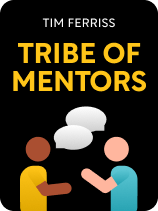

This article is an excerpt from the Shortform book guide to "Tribe of Mentors" by Tim Ferriss. Shortform has the world's best summaries and analyses of books you should be reading.
Like this article? Sign up for a free trial here.
What do you care about most? How much time do you give to what’s most important in your life?
In Tribe of Mentors, Tim Ferriss shares advice from a variety of people on how you should spend your time. Many agree that, to make choices about your time investments, it’s necessary to identify what matters most to you and prioritize meaningful causes over other ways you could use your time.
Continue reading to discover how to pinpoint and prioritize what you care about most in life.
Identify What’s Most Important to You
Many of Ferriss’s experts argue that assessing what you care about is the key to spending your time in a fulfilling way. Rabbi Jonathan Sacks asserts that, once you dedicate yourself to a noble life purpose that’s greater than yourself, you’ll feel fulfilled no matter what painful obstacles are in your way.
(Shortform note: Mark Manson’s book Everything Is F*cked explores how having a meaningful, future-oriented purpose gives humans the hope they need to endure painful situations. To build this kind of comforting hope, he recommends focusing on changing your beliefs about yourself. The unhappiest people are those who believe they’re uniquely defective and aren’t capable of accomplishing a life purpose. However, Manson argues that everyone is capable of doing something to make the future brighter. By reflecting on your past and positively reinterpreting your life story, you can forge new empowering beliefs that give you the hope you need to do something meaningful.)
So, what do you care about? How do you identify what’s most important to you? Pinterest founder Ben Silbermann recommends journaling to clarify your values. Take a break from your urgent daily tasks to reflect on what matters—write down what’s most important for you to do in the next few days, the next few months, and especially in the next several years. People feel lost and confused when they lose sight of their long-term intentions.
(Shortform note: In The Miracle Morning, Hal Elrod also recommends journaling to make sure you’re heading in a meaningful direction. To get the most out of your journaling, he recommends using it in conjunction with affirmation and visualization. Don’t just clarify what would be meaningful for you to do—state out loud what you want, what you’ll do to get it, and why. This helps override negative thought patterns so your unconscious mind moves you toward your goals rather than away from them. Then, imagine—in as much sensory detail as possible—what it’ll feel like to achieve your meaningful goal and reap the benefits of your dream life. This will help your ideal future feel more real and get you excited to take action.)
On the other hand, author Steven Pressfield (The War of Art) contends that discovering what’s most important to you isn’t this simple. He frames the search for personal values as an ongoing struggle, arguing that you can only learn who you are and what you care about naturally through life experience—in particular, through experimentation and failure.
(Shortform note: Even if it’s possible to immediately articulate and commit to a life purpose, you may benefit from waiting and experimenting in the real world. In Range, David Epstein argues that a broad range of life experience gives you unique, transferable skills that help you find success in whatever life purpose you end up committing to. For instance, if you start your own business but find yourself unfulfilled later in life, you can apply the same tenacity and problem-solving skills to a career in medicine. Additionally, trying out different pursuits makes it more likely you’ll end up in one you find fulfilling—the only way to know for sure whether a pursuit is a good fit for you is to try it out.)
Actively Prioritize What’s Important
After you’ve identified what’s most important to you, you can find fulfillment by spending time on that meaningful purpose. However, historian Sarah Elizabeth Lewis asserts that life is full of distractions keeping you from pursuing what matters most to you. To overcome this, Lewis recommends blocking out time every day to make progress on your most important goal. Dropbox founder Drew Houston agrees, offering the more extreme recommendation to track your time in detail and reflect objectively on how you spend each hour of the day. Then, proactively build large blocks of time into your schedule to accomplish important tasks.
(Shortform note: In 168 Hours, Laura Vanderkam concurs with Houston’s idea to track how you spend every hour of every day. However, rather than deeply reflecting on how you spend every hour—or even every day, as Lewis recommends—she suggests reflecting on how you spend each 168-hour block of your time. Add up how many hours you spent on sleep, work, family time, social media, your goals, and so on during a 168-hour period. Then, reflect on whether or not you’re satisfied with the time split between these activities. If you’re not spending enough time on your meaningful purpose, see if there’s a category in which you can cut down time—like social media, for instance.)
Financial blogger Pete Adeney argues that the biggest prioritization mistake people make is sacrificing their time and energy to earn money for things they don’t truly want or need. Adeney retired at age 30 with enough money to support himself and his family for the rest of his life on a frugal but comfortable budget. Accomplishing this involved rejecting anything that he didn’t value and saving up for what he really wanted: freedom from the obligation to work.
(Shortform note: How can you save enough money to retire at age 30? On his blog devoted to convincing the world that this frugal lifestyle is possible and satisfying, Adeney outlines several suggestions: Live close to work to reduce the cost of gas and car maintenance, only purchase cost-effective groceries, seek cheap and free sources of entertainment, and most importantly, invest all the money you can afford to.)

———End of Preview———
Like what you just read? Read the rest of the world's best book summary and analysis of Tim Ferriss's "Tribe of Mentors" at Shortform.
Here's what you'll find in our full Tribe of Mentors summary:
- Distilled life advice from over 130 world-class experts in various fields
- How to navigate non-traditional career paths, appreciate failure, and more
- Why you should allow a small amount of measured chaos in your schedule






